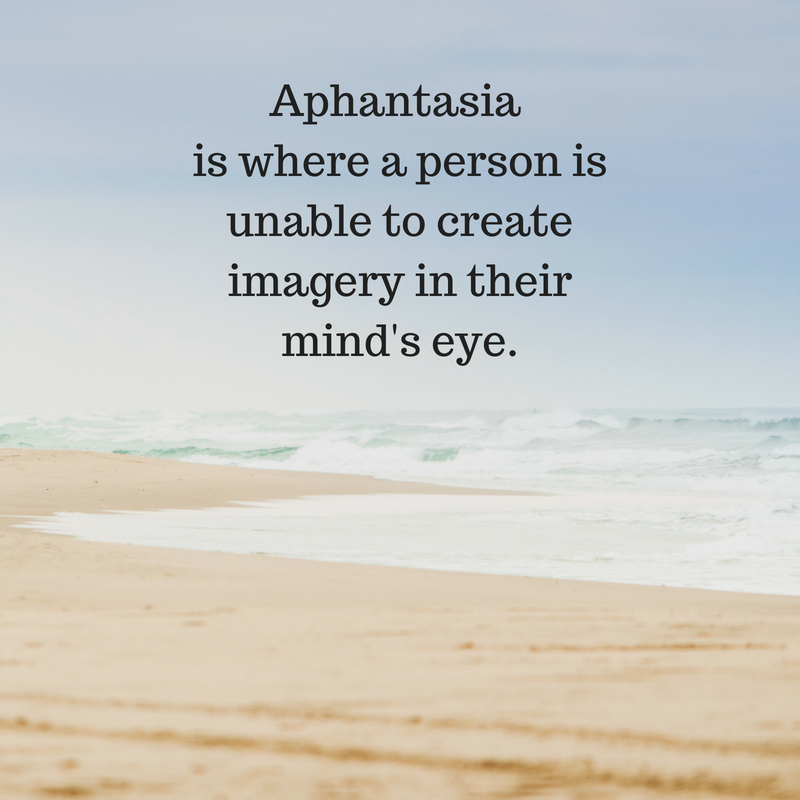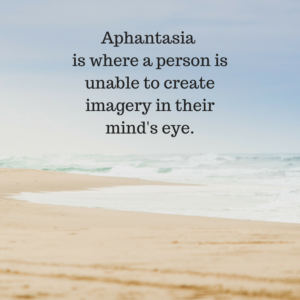I discovered something about myself in my adult life: I have aphantasia.
What this means is that I don’t construct visual images in my mind. Neither in my imagination or with my memories.
Honestly, until I was in my twenties, I had no idea other people could.
I figured when people “pictured things in their mind,” they were speaking metaphorically and just recreating the feel of the thing.
I can pull up an indistinct, sketchy image, like a vague watercolor. But mostly, if you ask me to think of a beach, I’ll imagine the texture of sand, the warmth of the sun, and the sound and feel of lapping waves, instead of creating a detailed image.
My husband is highly visual. When he reads books he says it’s like a movie playing out in his mind.
I can read a book and thoroughly enjoy the story without ever picturing the characters and only vaguely picturing the setting. I’m 4 books into Lindsay Buroker’s Emperor’s Edge books (which are fantastic), and have just now solidified the idea in my head that the assassin Sicarius has short blond hair. I only remember it now because the main character, Aramanthe, has recently touched his hair. When it was just a visual clue, my brain ignored it.
My husband would have known from the first moment Sicarius was described.
Some people talk about aphantasia as though it’s some sort of disability, but to me, it’s just a different way of thinking and remembering.
When I think of the beautiful lookout we stopped at on a pass between Wyoming and Idaho years ago, I can’t recreate the exact picture. But I remember the vastness of it, the way the mountains piled up, one behind another, paling as they shrank down into a blazing, cloud-filled valley. I know that the air was vigorously fresh, and everything about the moment flung out in a wild freedom.
And so I don’t miss the fact that I can’t picture it with visual details.
If I see a picture of that pass, I recognize it immediately. But if you take the picture away, I can’t recreate the image in my mind.
There was an exhibit at the Chicago Museum of Science and Industry once that tested facial recognition. It flashed a face up on a screen for a second or two, then you had to spin some wheels to select the right hair, eyes, nose, and mouth of the person you’d just seen.
I just stared at the exhibit wondering what I was missing. Why would they ask something so impossible? My husband walked up, did a couple faces without blinking, and moved on because it was boring.
That was the first time I KNEW something was different in my brain.
Which leads me to one of my worst fears:
When I was little, I thought police sketch artists were just a device that TV shows used to tell the cops who the bad guy was. Because how could someone in real life remember a face well enough to describe it to an artist? And more impossible yet, have them adjust the picture until it was right?
If I’m ever the sole witness to a crime, people, we’re in trouble. Unless the police are good at picking out criminals from descriptors like, “He was smallish, but fierce. His hair was…um…well, it looked a little angry. Also, he skulked.”
The question I always get next is: How do you describe things in you books without being able to see them in your mind?
Which is an excellent question, and shall be answered in my next post.





“But mostly, if you ask me to think of a beach, I’ll imagine the texture of sand, the warmth of the sun, and the sound and feel of lapping waves, instead of creating a detailed image.”
“Some people talk about aphantasia as though it’s some sort of disability, but to me, it’s just a different way of thinking and remembering.”
Perhaps if you couldn’t do what you described in the first quote above, you might feel differently about the second. Because for me there’s no vague images, no imaginary warmth, no sound of lapping waves. There is no internal access to sensory data of any kind, at any time, awake or asleep.
Aphantasia is a neurological anomaly, that affects people on a wide spectrum. Some, like you, only experience part of it. They have an inability to see clearly in their mind, may or may not have the same result when dreaming, and don’t really struggle with other sensory information. Some, like me, have it completely, awake or asleep, with all sensory data affected. And there are people all over the spectrum, with all kinds of variants.
If it has never significant impeded your ability to learn, to function – if it doesn’t make it very hard for you to remember people you haven’t seen in years, making you look thoughtless, if it doesn’t make it very easy for you to get lost because you can’t easily recognize landmarks, if it doesn’t make you prone to mixing up numbers when transferring them from one place to another, if it doesn’t impact your ability to recognize shapes and colors – then it’s natural you wouldn’t even call it a learning disability. But for others, it’s quite natural that they would call it one.
But the important thing to remember is not to attempt to define anyone else’s aphantasia, and how it has impacted their life, based on your own experiences with it. Because I’ve spoken to hundreds of people with aphantasia over the years, and I’ve never heard the same version twice.
I’ve been doing meditation for the last 46 years. I didn’t realize until about 10 years ago how much trouble visualizations were to people. They would close their eyes and lots of images (memories, fantasies, etc) would come forward.
I close my eyes and it’s dark . Turns out this is great for meditation. I didn’t have to spend years learning to “not see things” – haha.
That said, I’ve found that you can slowly increase your ability to visualize. Sometimes, a quick image might flash up, or I might notice that I was dreaming and saw images, usually as I’m waking up, but not yet fully awake.
There’s a peculiar state of relaxed “in a certain way” mind that can let some of this “come out”. I just notice it, without trying to make it happen. And I notice how my mental state changes as I notice it, and as my mental state changes as it goes away.
That is so amazing and strange to hear that you have something odd but fascinating as this. Especially with the Keepers Chronicles being one of the most visual books I have read in a long time. When you described how you replay memories in your mind. I can understand the disorder. Im like your husband were I can quickly remember visually also. Knowing that you have this makes your books even more amazing. Also thank you for the contest and your post. It is so cool to receive a real and p personal email from a famous author. Which by the way congrats on the well deserved sales.
WOW – if that’s how you write with this “problem” then I wonder how you’d write without it & maybe you’d be more hampered by it.
I’ve just finished Tomkin’s dragon story & all the way through was picturing every scene because you elaborated to intensely on every nuance of it – shapes, colours, movement, sounds, etc and absolutely all of those built up a ‘video’ as your husband said of the story unfolding.
Regardless – your writing is just phenomenal and I just want tons MORE!
Romayne
Belfast UK